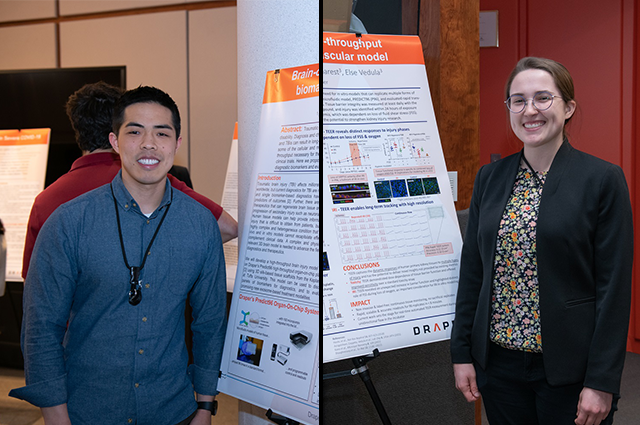Draper Scholars present research on injury management

Tufts School of Engineering students participate in top programs and research opportunities, such as the Draper Scholar Program. Two Tufts students, Peter Hsi and Erin Shaughnessey, are currently Draper Scholars and were among 17 MS and PhD students who presented their research at the 2023 Draper Research Symposium, supported by Draper Laboratory. Participants in the program must be students at one of 11 member universities and must complete research in collaboration with a faculty member and a Draper technical support staff member.
Hsi’s research focused on improving diagnosis and treatment of traumatic brain injuries (TBIs). TBIs often go undiagnosed due to lack of monitoring in the aftermath of a trauma-inducing situation and difficulty identifying long-term symptoms. Combining Draper technology with a 3D silk model of the brain developed in Stern Family Professor David Kaplan’s lab, Hsi will investigate biomarkers to diagnose TBIs as well as evaluate potential treatments. His presentation, “The Brain-on-chip Model for Characterization of Diagnostic Biomarkers and Evaluation of Therapeutics for TBIs,” outlined his plan to develop a TBI model and test potential treatments for the injury.
Hsi is currently earning his PhD in biomedical engineering at Tufts. He is also a senior member of technical staff at Draper Labs in the cell and tissue engineering group.
Shaughnessey presented her work on a novel in-vitro kidney injury model in a presentation titled “TEER as a Readout of Kidney Injury in a High-throughput Microfluidic Human Proximal Tubule-microvascular Model.” With support from her faculty advisor, Associate Professor Lauren Black, and members of Draper Labs, Shaughnessey tested the effectiveness of using trans epi/endothelial electrical resistance (TEER) to measure kidney damage. She found that TEER offers a rapid and accurate option for monitoring kidney injuries that had some advantages over other methods, including improved sensitivity in measuring toxicity. Her work has implications for improving understanding and management of kidney injury.
Shaughnessey recently earned her PhD in biomedical engineering at Tufts and will continue working with Draper Labs after graduation.
The Draper Scholar Program allows students to take advantage of cutting-edge technology such as the Draper Predict96 Organ on a Chip platform to push the frontiers of their research. Shaughnessey and Hsi both presented in the materials and devices section of the symposium and utilized organ on chip devices in their work. A more advanced alternative to using cell cultures, organ on a chip technology replicates an organ or organ system on a microfluidic chip and can be used for accurate in vitro drug testing.
For 50 years, the Draper Scholar Program has supported master’s and PhD students as they pursue research in technical areas of interest to Draper, a nonprofit research and development organization headquartered in Cambridge, Massachusetts. From artificial intelligence to space technology, Draper Scholars engage in high-impact research that bridges the gap between industry and academia.
Department:
Biomedical Engineering